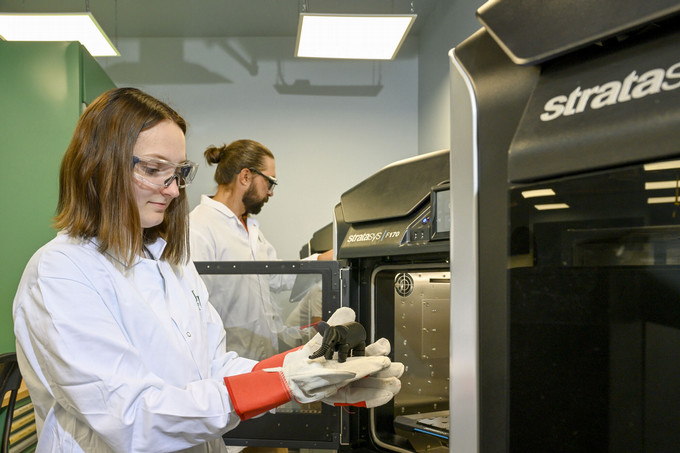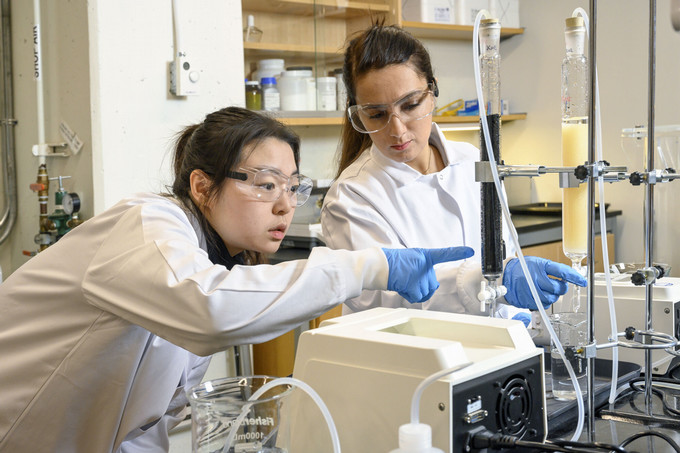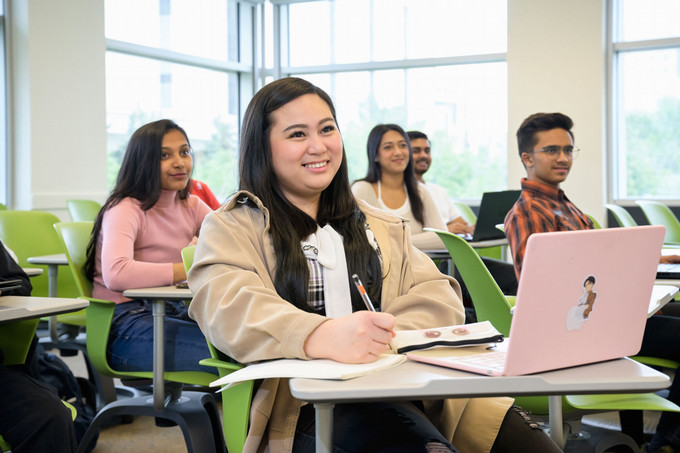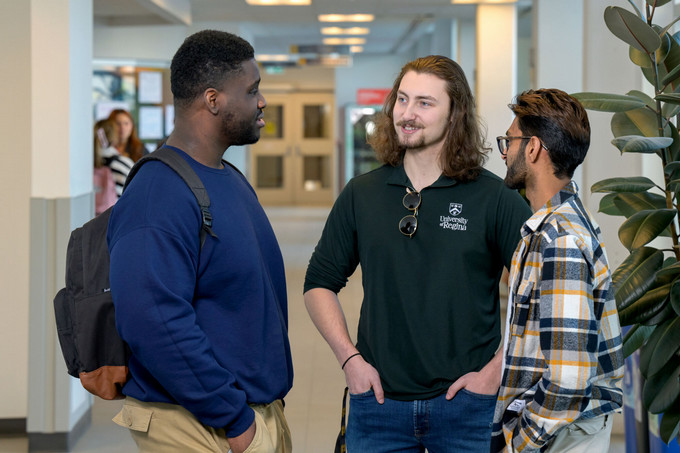
Discovery
Strengthen Our Connections Among Students, Faculty, and Staff
Where teaching and research come together, daring discovery occurs. Discovery includes the development and dissemination of new knowledge, as well as the personal insights that arise from active learning. An empowering education provides our students with the skills and self-confidence required to navigate the world around them throughout their time at the University of Regina and beyond.
Goal: All students will participate in experiential learning opportunities. 1
1 Experiential learning: as all “beyond the classroom” participation at the undergraduate and graduate levels, including but not limited to research, creative work, internships and co-operative education placements, practicum, professional and fieldwork placements, program-related volunteer opportunities, study abroad, academic exchanges, and other international experiences.
Excellence in Teaching and Research
We teach and support students to think critically, engage in ethical reasoning, understand their worlds and the worlds of others, and actively contribute to the betterment of society.
Our commitment to fostering a diverse and inclusive environment is a statement and a lived reality. This commitment is instrumental in attracting and retaining teachers and researchers to the University’s faculties and units. It builds on the U of R’s existing areas of national expertise, such as the Child Trauma Research Centre (CTRC), the Canadian Institute for Public Safety and Research Treatment (CIPSRT), the Clean Energy Technology Research Institute (CETRI), and the Institute for Energy, Environment and Sustainable Communities (IEESC), while seeking opportunities for new collaboration with other academics and institutions globally.
Beyond the classroom—in fieldwork, internships, performances, and academic exchanges—our focus on experiential learning creates discovery opportunities and better prepares students for life and work. It contributes to Saskatchewan’s economy and builds a better quality of life for people and communities.
The University of Regina is home to a diverse research community that includes faculty members, graduate and undergraduate students, post-doctoral fellows, and several research chairs. Ten institutional-level research centres and institutes and numerous faculty-operated centres support research collaboration and research partnerships focused on our strengths.
Indigenous research is a growing focus as we encourage and support Indigenous ways of knowing. Several centres and institutes reflect this in their projects and partnerships. With $31.4 million in research revenue in 2020-21, the University of Regina has emerged as a centre of excellence on several research fronts. Our four signature research areas are based upon research impact, critical mass of highly qualified personnel, distinctiveness, and commitment to partners in the community and the Province of Saskatchewan.
The University of Regina was named the 2020 Research University of the Year in the undergraduate university category by Research Infosource, a leading source of ranking information on research and development in Canada. Based on six different categories, the University that demonstrates superior performance on critical measures of research success receives the designation.
We value and support a learning environment with the services required to allow for high-quality teaching, research, and learning that strengthens the academic successes of our students and faculty and improves the lives of Canadians. We have an unwavering commitment to discovering new knowledge through two-eyed seeing, co-learning Indigenous and Western worldviews, and aligning research and teaching.
In pursuit of our objectives, we are dedicated to enhancing students’ opportunities to gain meaningful interactions with faculty, staff, and communities, well-rounded learning experiences and career readiness. We believe a strong foundation in these areas is crucial for our students’ success.
Objective Goals
- Support and value research and creative work
- Support and value excellence in teaching
- Engagement with varied disciplines at the University to apply skills in interdisciplinary, multidisciplinary, and transdisciplinary projects
- Enhance supportive technologies for research and teaching
- Promote and adopt EDI principles within the research and creative enterprises

Student Success
At the University of Regina, we take pride in our graduates who experience the best employment outcomes among all post-secondary graduates in Saskatchewan. Our unique leadership in experiential learning is a critical factor in this success. Since pioneering the first cooperative education program in Western Canada in 1969, we have expanded our reach to offer Cooperative Education & Internships Program in over 50 programs across the Faculties of Arts, Business Administration, Engineering and Applied Science, and Science. This commitment to experiential learning ensures our graduates leave our campus fully prepared to succeed.
Our degree programs are designed to incorporate experiential learning, and this is evident in the financial benefits our cooperative education students reap. Annually, these students earn approximately $10 million, a testament to the success of our program. Over the past decade, co-op job placements and internships have increased by 60 percent, demonstrating our commitment to developing career-ready graduates and connecting students with potential employers.
In Fall 2022, the University opened the Centre for Experiential and Service Learning, which gives students new opportunities to gain experience in both paid and volunteer positions. This results in career-ready graduates who find work quickly.
Our focus on collaborative and integrated discovery is designed to give our students the skillset they need to succeed on their chosen path. We are committed to helping all students achieve their goals and strengthening their ability to connect with learning opportunities. This ensures they develop the independence and agency to pursue their life and career goals. We will continue to discover and meet students’ needs, providing them with the support they require to thrive in their programs and graduate promptly.
Objective Goals
- Prioritize the investigation of current retention and graduation rates of undergraduate and graduate students and identify tangible activities to increase these rates
- Strengthen on- and off-campus supports for enhancements to teaching and opportunities for experiential learning for all students
- Create and implement a retention plan for students that includes specific strategies for increasing retention and graduation rates, prioritizes student success programs, and identifies students who would benefit the most from interventions
- Create and implement a strategic enrolment plan for the entire University that includes goals, strategies, and tactical work plans that include returns on investment
- Provide supports (e.g. UR Guarantee) to graduate career-ready students
- Evaluate distance and distributed learning opportunities and technologies to enhance flexible learning options for students

Internationalization
One of the University of Regina's most notable achievements is the significant increase in international student enrollment in recent years. In 2021, our international student body accounted for 17.1 percent of the total student population, a testament to our global appeal and reputation.
These students, with their diverse backgrounds, unique perspectives, and different worldviews, enrich the fabric of our University and community. Their presence not only enhances our academic environment but also contributes to the growth of our province's economy, often leading to permanent residency in Saskatchewan.
Our collaborations with global academic institutions are not just about bringing the world to our campus, they are about making a global impact. We work with community stakeholders, government organizations, and funding agencies at home and abroad to collaborate on teaching, research, and community development, inspiring hope and optimism for a better future.
In 2021, the University had 309 international institutional agreements with 44 countries, facilitating student, research, and faculty mobility opportunities. Our global reach continues to extend outwards with positive results.
We strengthen the impact of our discoveries when we recognize and incorporate international points of view and develop strong relationships with individuals of diverse backgrounds. By integrating international, intercultural, and global dimensions into our discovery efforts, we will broaden the perspectives and heighten the impact of our collective discovery.
We will push the boundaries of discovery by creating globally aware citizens through
- The inclusion of international students and research collaborators
- The promotion of student, faculty, and staff mobility
- The incorporation of local and global worldviews into our teaching and research
Objective Goals
- Create a diverse and inclusive community through targeted recruitment and support of students, faculty, and staff
- Encourage, support, and promote internationalization through the integration of diverse worldviews into discovery, through research, teaching, and partnerships
- Encourage, support, and promote student, faculty, and staff research and scholarship abroad
- Invest in technology that allows for international participation in teaching, research, and learning programming with an awareness of environmental impacts
- Attract and retain international students and research collaborators
